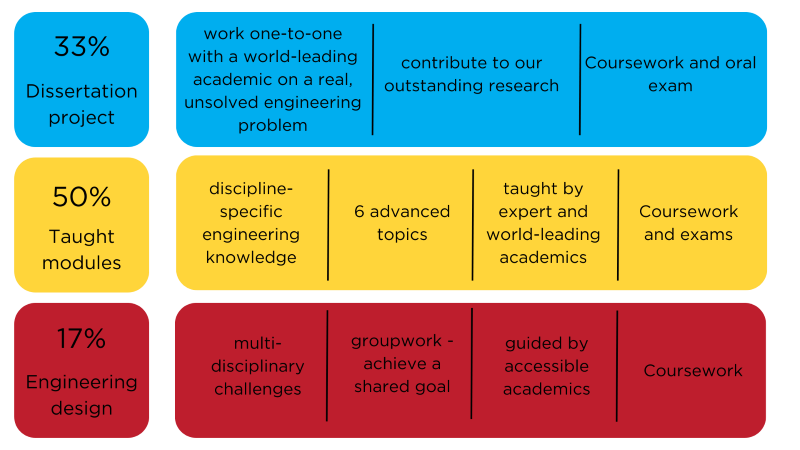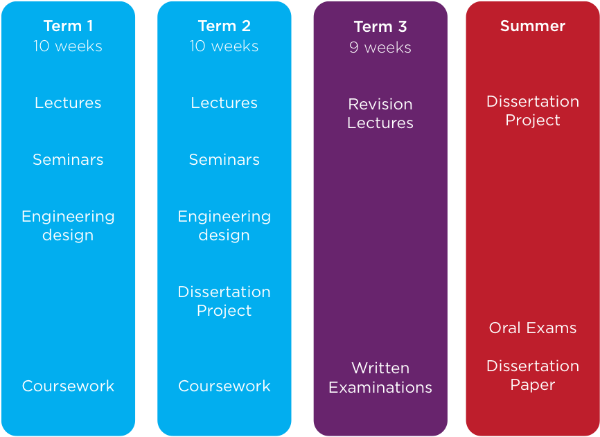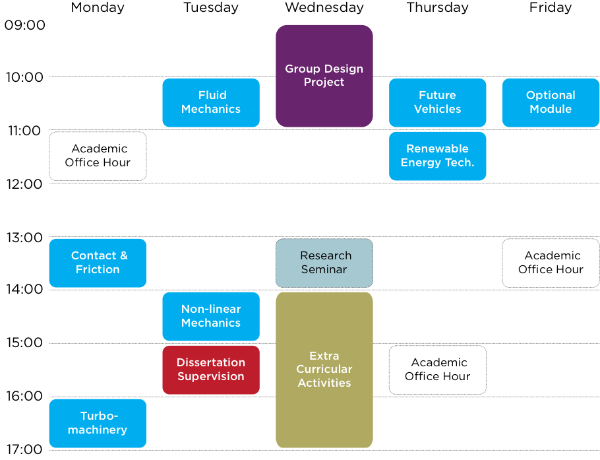Taught Courses
Taught degrees are typically one year Masters programmes, based upon a structure of lectures, seminars and tutorials. At Durham University, we consider Engineering as an integrated subject rather than sub-dividing the discipline into narrow areas. We follow a modular system and you will normally have a number of core modules and the opportunity to select a number of optional modules.
The postgraduate taught route is ideal for anyone who prefers a structured framework for their studies but one which also allows a certain degree of flexibility and scope for building research skills. The Department offers an excellent environment for postgraduate study. These pages will tell you all you need to know about studying for a taught Masters degree in Engineering at Durham.
- MSc Advanced Mechanical Engineering
- MSc Biomedical Engineering
- MSc Civil Engineering
- MSc Electrical Engineering
- MSc Electronic Engineering
- MSc Energy Engineering Management will be discontinued from 2026/27
- MSc Engineering Management
- MSc Environmental Engineering
- MSc Renewable and Sustainable Energy
We also contribute to the MSc in Artificial Intelligence for Engineering, part of the MISCADA family of programmes. For more information, please visit the MISCADA webpage.
Note:
Most of our MSc courses require ATAS approval, applicable to all international students (apart from exempt nationalities) who are subject to UK immigration control. Please leave sufficient time (6 weeks) for ATAS application in advance of making your student visa application.
Find out more about ATAS at Academic Technology Approval Scheme (ATAS) - GOV.UK (www.gov.uk).
Course Content
We deliver a balance of taught content, group design and individual cutting-edge research project. The contents and the weightings of these elements are shown below.

Durham University runs a term system with one examination period per year. The first and the second term, each having 10 weeks, are for teaching activities. Term 3, having 9 weeks, are for revision lectures and exams. After that, you will spend your full time to do the individual research project until end July.

Students have around 10 hours per week of contact time. The example timetable for Advanced Mechanical Engineering shown below provides an indication of how you will be spending your time (timetables change year to year). The blue blocks are lectures (6 of lectures per week - roughly one per module), the purple block is group design project, the red block is for research project supervision meeting and the white blocks are optional sessions where you can speak one-to-one with an academic. Wednesday afternoons are kept free for research seminars and extracurricular activities.

Scholarships and Prizes
Several scholarships are available to apply, including Alumni Fee Scholarship; see the comprehensive lists of scholarships here and here to check coverage, eligibility and application deadlines.
In particular, we offer scholarships to international applicants from six countries; details can be found here. For international applicants from other countries, a list of other scholarships can be found here. Additionally, STEM students from North East England may be eligible for the Guy Beresford Scholarship, offered through Hatfield College.
The department also offers 15 prizes to the students of outstanding performance at the end of each academic year.
Contact Email Addresses
|
Taught Postgraduate admissions queries |
|
|
Taught Postgraduate queries (excluding admissions) |
Student research projects result in journal paper publications
We are particularly proud of our MSc project students who successfully publish research articles using their project outcome in peer review journals.


/prod01/prodbucket01/media/durham-university/departments-/engineering/74202-5112X1676.jpg)